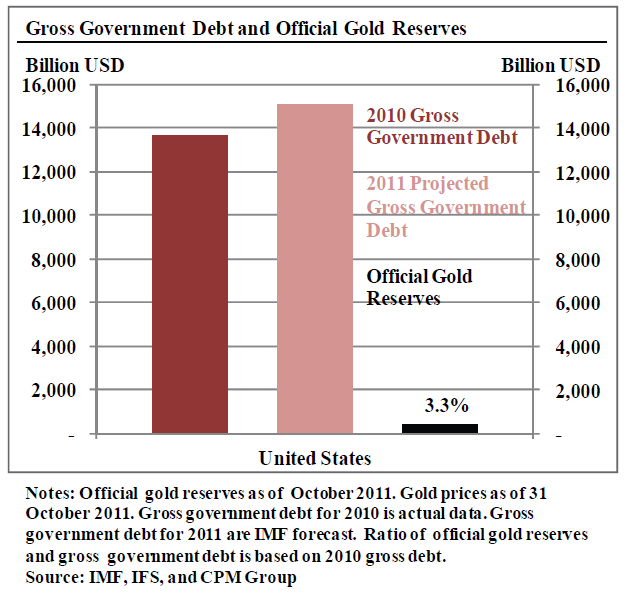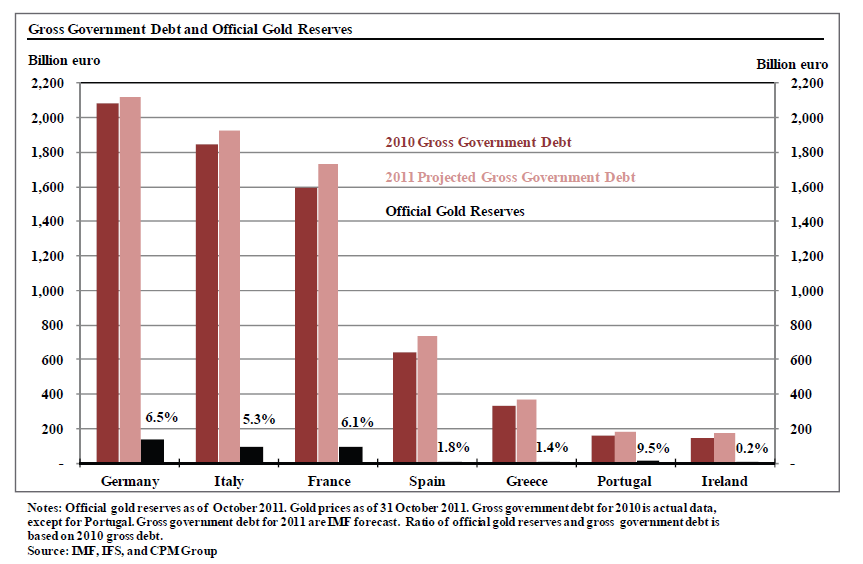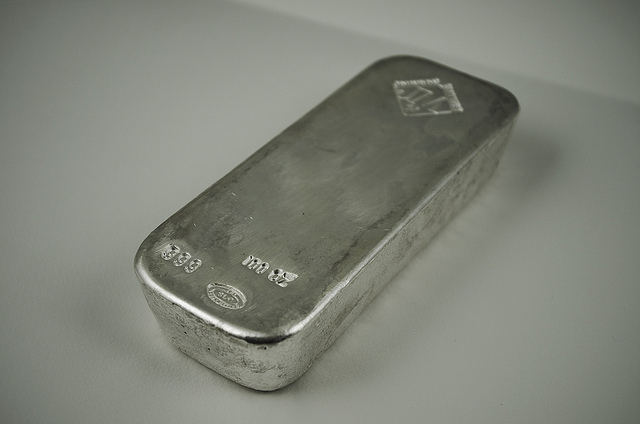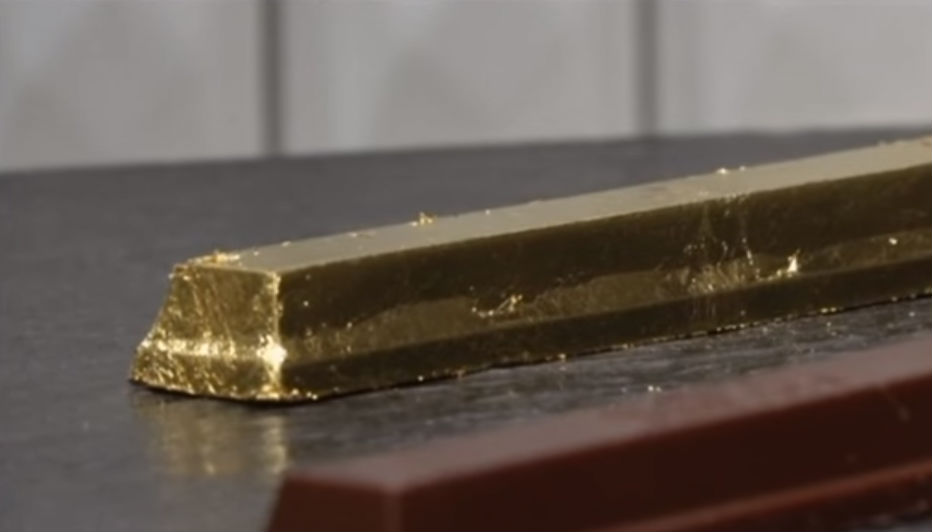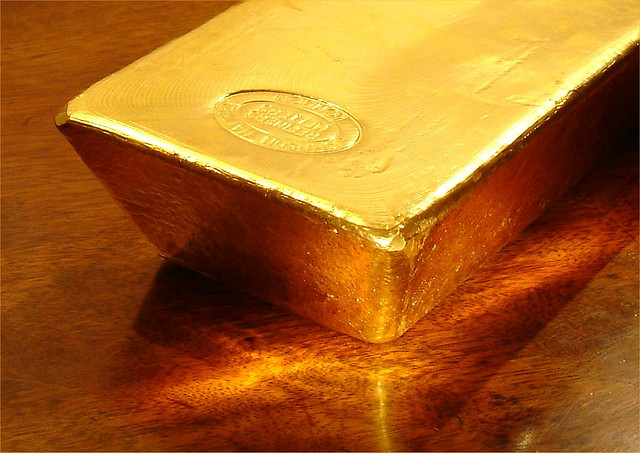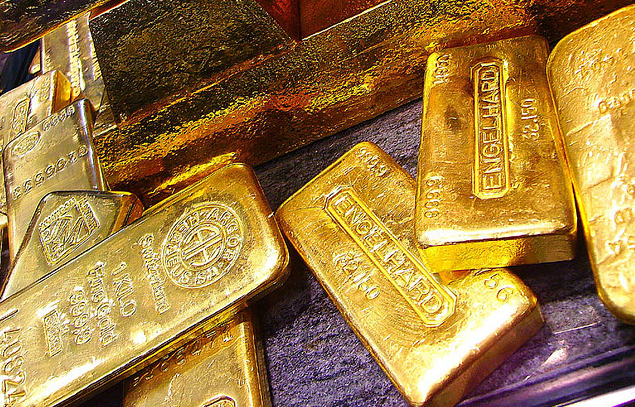Nyheter
The potential effects on the gold market of a Greek withdrawal from the ECB
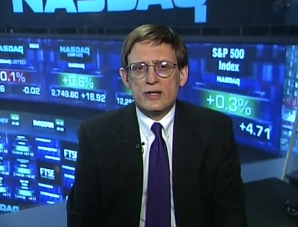
 The new year has dawned with continued market speculation about what the gold market implications would be if Greece were to withdraw from the European Central Bank (ECB) system and sever its use of the euro in favor of a new drachma. CPM Group views such a development highly unlikely, because it would be so utterly destructive in economic, financial, and political terms. Our opinions – and those of the seemingly like-minded vast majority of financial market participants – notwithstanding, the speculation continues. Since several clients have requested insights from CPM Group concerning the potential impact on gold of such a withdrawal by Greece or other member governments from the ECB and euro, CPM Group is issuing this Market Commentary on the subject.
The new year has dawned with continued market speculation about what the gold market implications would be if Greece were to withdraw from the European Central Bank (ECB) system and sever its use of the euro in favor of a new drachma. CPM Group views such a development highly unlikely, because it would be so utterly destructive in economic, financial, and political terms. Our opinions – and those of the seemingly like-minded vast majority of financial market participants – notwithstanding, the speculation continues. Since several clients have requested insights from CPM Group concerning the potential impact on gold of such a withdrawal by Greece or other member governments from the ECB and euro, CPM Group is issuing this Market Commentary on the subject.
Much of the speculation has focused on the potential that as part of a Greek withdrawal from the euro the Greek government might decide to sell gold from its monetary reserves. Some comments suggest that the Greek government, or some other government pulling out of the ECB, could be compelled to sell its gold reserves. Another strain of commentary suggests that the ECB might be required or forced to sell gold in such a situation.
First, there are no legal or contractual mechanisms compelling such a sale by the Greek central bank, the ECB, or any other central bank. The gold these central banks hold is in no way pledged against any of the sovereign debt of their respective governments. So, in the most superficial way, a withdrawal by Greece or another member would not necessarily or likely precipitate a government sale of gold that could have a direct negative impact on gold prices.
More important, the consequences for gold of the macroeconomic and financial fall-out from such a withdrawal would have a much more dynamic and forceful effect on the gold market and gold prices than any gold-focused actions by the Greek central bank or ECB.
If Greece were to withdraw from the euro system, its gold holdings would be the least of the issues to watch. Greece would immediately move into bankruptcy as a government, defaulting on all of its loans. Greece only holds 3.6 million ounces of gold worth $5.9 billion at today’s price.
Greece’s government debt is around $485 billion, so only around 1.4% of it could be covered by selling gold – assuming the price would not plunge on the event.
In other words: Greece will be highly unlikely to sell any of its gold to pay its debt. It would seek to hold on to its capital stock. As discussed in a Market Commentary issued 6 December 2011 on issues related to the concept, that Europe and the United States could use their gold reserves to pay down their debt: for all of these countries the value of their gold reserves is a small fraction of what they owe. Selling their gold from their capital accounts would do nothing to fix the fiscal deficit problems that are the basis for the rising debt. If they sold their gold they would throw away some of their capital stock and leave themselves in much worse financial conditions. Also, as mentioned above, there are no laws, regulations, rules, policies, or anything else that would say Greece or any other country would need to or could be compelled to sell its gold or lease it.
Meanwhile, if Greece pulled out of the euro system, it could face dissolution, while Europe could face a massive economic depression worse than the 1930s and a series of political revolutions. (All of which is why one should not expect the euro and ECB to collapse: The costs are too high to allow and governments will do whatever is necessary to protect Europe, and its jobs, against such an inevitability.) So, again, the effects of a Greek withdrawal from the euro system on gold primarily would be felt much more through its effects at the monetary and macroeconomic level, and not related to its gold holdings.
The ECB would not need to sell its gold to recapitalize. It would have to return a bit to Greece, which has deposited some gold with the ECB as part of its contribution, but the amount would be small. The gold held by the ECB is considered Tier 1 capital. It would rise in value. So, the ECB would want to hold on to its gold and not sell it, as it would help it immensely.
Another question related to whether the ECB could violate the European Central Bank Gold Agreement (CBGA), which includes a guideline for how much gold signatory central banks will sell in any given year. The European CBGA is non-binding. Central banks that are party to the CBGA can do whatever they want with their gold, at the end of the day, with total disregard for this agreement.
This Market Commentary is based in part on material contained in CPM Group’s Gold Long-Term Outlook, released January 2012. The two charts on this page are taken from that report, and were used in Market Commentary 2011-3, released 6 December 2011.
[hr]
About CPM Group
CPM Group is a commodities market research, consulting, asset management, and investment-banking firm.
CPM focuses on various commodities markets from precious metals to tropical soft commodities. In its twenty years as an independent company, CPM has consistently delivered unique, market-leading research and services to clients ranging from individual investors to leading international organizations worldwide.
Nyheter
AI ökar det totala elbehovet i USA med 100 % kommande 15 år

De stora tech-företagen i USA har varit drivande i att utveckla marknaden för fossilfri energi. De vill ha fossilfri energi och har inte bara pratat utan skrivit många storskaliga avtal och lagt pengar på att det byggts mer produktion. Men nu står tech-bolagen och elproducenterna inför enorma utmaningar, för AI kräver stora mängder elektricitet.
Om vi går tillbaka till 2021 så var elbolagens prognoser att efterfrågan på elektricitet i USA under kommande 15 år skulle öka med några få procent. Inte per år, utan några få procent över hela perioden på 15 år.
Stora elbolag har planeringscykler på 10 år, de har ingen vana av att plötsligt i högt tempo dubblera produktionen.
Men vid 2023 förändrades prognosen helt och hållet, då blev prognosen att efterfrågan på elektricitet skulle öka med 100 procent på 15 år.
Bloomberg-podden Odd Lots har bjudit in Brian Janous för ett samtal om situationen. Han är medgrundare och chefsstrateg på Cloverleaf Infrastructure och var tidigare 12 år på Microsoft som företagets första anställd med fokus på energi och har därför på nära håll sett utvecklingen inom datacenter och deras elbehov.
Nyheter
Fortum och Vargön Alloys tecknar femårigt avtal om kärnkraftsel
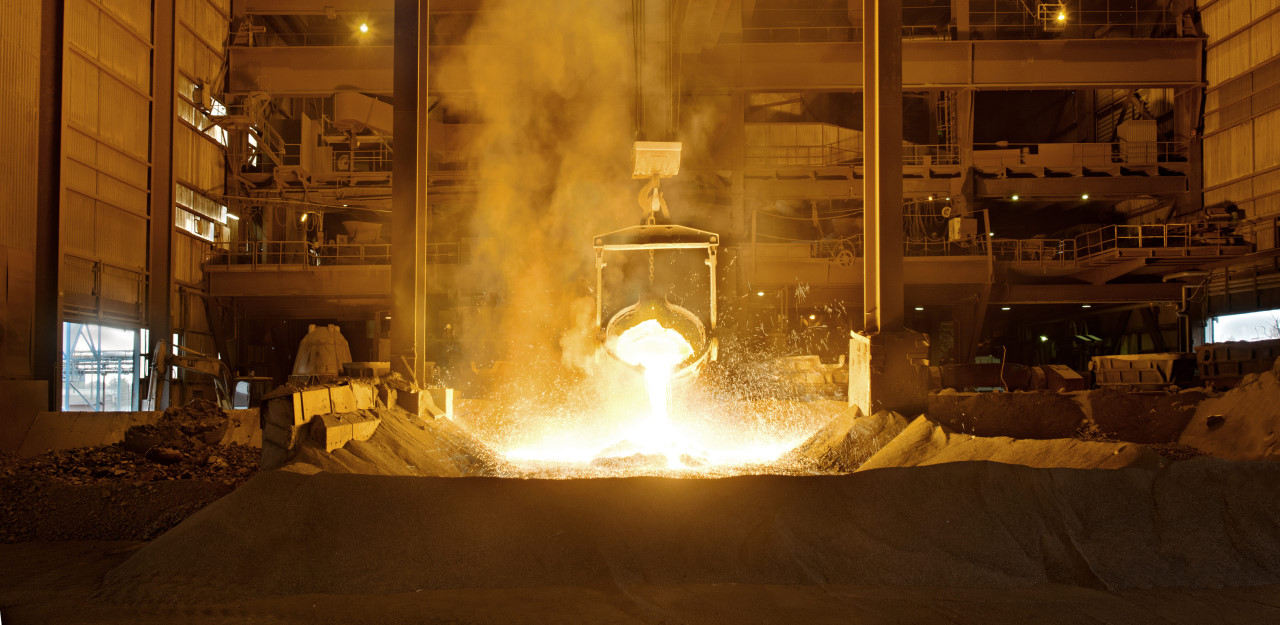
En framgångsrik omställning kräver stora mängder pålitlig och prisvärd fossilfri el skriver Fortum. Företaget har nu skrivit ett femårigt avtal om att leverera kärnkraftsel till Vargön Alloys.
”Vår uppgift är att se till att elen finns tillgänglig precis när våra kunder behöver den. Långsiktiga partnerskap spelar här en viktig roll.”
Avtalet omfattar elleveranser på 0,4 TWh per år och inkluderar ursprungsgarantier för kärnkraft i SE3 för hela volymen. Leveranserna börjar i december 2024. Vargön Alloys AB, beläget vid Göta Älv i Vänersborg, är en av Europas största tillverkare av ferrokrom, den legering som ger stålet dess hårdhet och motståndskraft mot korrosion.
– Jag är mycket förväntansfull inför de möjligheter som avtalet med Fortum ger oss som företag. Vårt partnerskap representerar en gemensam vilja att ta ett hållbarhetsansvar och vi ser att detta kommer ha en positiv påverkan för vår verksamhet, det säger Anders Lehman, vd Vargön Alloys.
Avtalet bidrar till Fortums strategiska mål om att ha minst 20 procent av sin produktion, under en rullande tioårsperiod, prissäkrad.
Nyheter
Kärnkraftreaktorutvecklaren Blykalla har gjort en kapitalanskaffning på 80 Mkr

Blykalla har genomfört en kapitalanskaffning om 80 miljoner kronor. Rundan leddes av Norrsken Launcher tillsammans med Nucleation Capital, med deltagande från Earth Venture Capital, Farvatn och flera privata investerare.
Det tillförda kapitalet kommer att vara avgörande för Blykallas industrialisering av sin avancerade kärnreaktor, SEALER (Swedish Advanced Lead-cooled Reactor). SEALER är konstruerad för kommersiell kraftproduktion i ett mycket kompakt format, med unika säkerhetsfunktioner som möjliggörs av ett antal egenutvecklade innovationer.
En av dessa viktiga innovationer är Blykallas korrosionstoleranta stållegeringar, som möjliggör effektiv kylning av reaktorer med flytande bly. Med detta tekniska genombrott säger Blykalla att de kan uppnå effektiv serieproduktion, vilket leder till snabbare driftsättning och lägre kostnader än konventionell kärnkraft. SEALER gör det också möjligt att använda kärnkraft för att minska koldioxidutsläppen i industriella tillämpningar genom produktion av vätgas, biokol och biobränsle, utöver lokal elproduktion. Slutligen bidrar denna teknik till att förverkliga en cirkulär avfallsmodell. Jämfört med konventionell kärnkraft kan SEALERs bränslecykel utvinna upp till 140 gånger mer energi ur uranmalm, vilket endast ger en bråkdel av avfallet, som behöver lagras under endast 1 % av deponeringstiden.
Rod Adams, Managing partner på Nucleation Capital, säger: ”Vi är mycket glada över att kunna investera i Blykalla, en grupp med unik och mycket konkurrenskraftig korrosionsskyddsteknik för användning i deras relativt mogna blykylda reaktorkonstruktion. Denna teknik kommer att göra det möjligt för dessa reaktorer att överträffa sig själva som en avancerad kärnkraftsdesign, som kan ge tillförlitlig och koldioxidfri kraft till energiköpare runt om i världen.”
Norrsken, som ledde bolagets såddrunda tillsammans med Uniper 2022, säger: ”Blykalla bygger ett team i världsklass för att ta företagets unika IP mot snabb industrialisering. Denna teknik kommer att vara avgörande för den europeiska övergången till grön, säker baskraft som så desperat behövs för att minska koldioxidutsläppen i industrin, säkra nätets tillförlitlighet och leverera på de enorma behoven av att driva AI”, enligt Erik Engellau-Nilsson, partner på Norrsken Launcher.
Tien Nguyen, grundande partner på Earth Venture Capital, kommenterar: ”Vår investering i Blykalla understryker vår fasta tro på deep-tech vid en tidpunkt då Sydostasiens behov av ren, hållbar energi är obestridligt. Med Indonesien, Singapore, Filippinerna och Thailand i spetsen beräknas efterfrågan på SMR-driven energi överstiga 10 GW år 2035. Detta återspeglar ett akut behov av energilösningar som kan driva på den ekonomiska tillväxten och samtidigt säkerställa ett hållbart klimat. Blykallas innovativa tillvägagångssätt är perfekt anpassat för att hantera denna utmaning och erbjuder en skalbar, effektiv energilösning.”
Blykalla är för närvarande i förberedande arbete för att licensiera tekniken i Sverige, en regulatorisk miljö som snabbt anpassas till utvecklingen av ny kärnkraft. Ett viktigt steg för att industrialisera och kvalificera tekniken är att bygga den elektriska testreaktorn i Oskarshamn, som utvecklas tillsammans med OKG (Unipers svenska dotterbolag) och KTH (Kungliga Tekniska Högskolan). Parallellt för företaget diskussioner med industriella partners för att stödja byggandet av kärnreaktorer för off-grid värme- och elproduktion. Blykalla har hittills mött marknadsintresse från aktörer inom gruv-, stål- och andra energiintensiva industrier.
Jacob Stedman, Blykallas VD, kommenterar: ”Det är fantastiskt att vara en del av denna kärnkraftsrenässans, och att se hur stort intresset för kärnkraft är från företag i takt med att de regulatoriska förutsättningarna faller på plats. SEALERs funktioner, kostnad och effekt gör den perfekt lämpad för industriella användare som vill minska koldioxidutsläppen och bli enda avnämare, eller till och med ägare, av SMR. Det speglar det starka och brådskande behovet från industrin att säkra tillgången till ren och konkurrenskraftig energi. Detta kommer trots allt att vara avgörande för branschens gröna omställning och fortsatta tillväxt.”
-

 Nyheter2 veckor sedan
Nyheter2 veckor sedanGuldpriset når nytt all time high och bryter igenom 2300 USD
-

 Nyheter4 veckor sedan
Nyheter4 veckor sedanGuld toppar 2200 USD per uns
-
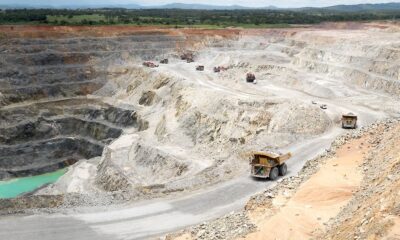
 Nyheter3 veckor sedan
Nyheter3 veckor sedanLundin Mining får köprekommendation av BMO
-

 Nyheter4 veckor sedan
Nyheter4 veckor sedanVertikal prisuppgång på kakao – priset toppar nu 9000 USD
-

 Nyheter4 veckor sedan
Nyheter4 veckor sedanKaffepriserna stiger på lågt utbud och stark efterfrågan
-

 Nyheter2 veckor sedan
Nyheter2 veckor sedanCentralbanker fortsatte att köpa guld under februari
-

 Nyheter2 veckor sedan
Nyheter2 veckor sedanHur mår den svenska skogsbraschen? Två favoritaktier
-

 Nyheter2 veckor sedan
Nyheter2 veckor sedanKakaomarknaden är extrem för tillfället


